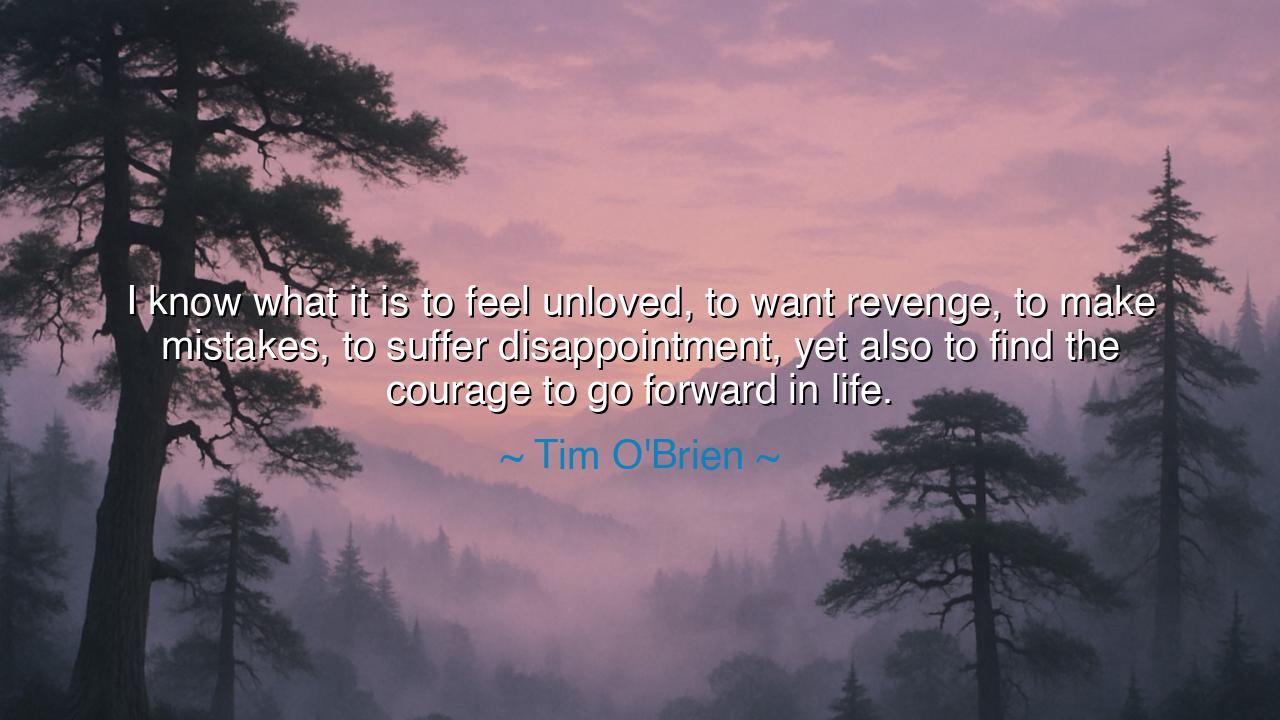
I know what it is to feel unloved, to want revenge, to make
I know what it is to feel unloved, to want revenge, to make mistakes, to suffer disappointment, yet also to find the courage to go forward in life.






"I know what it is to feel unloved, to want revenge, to make mistakes, to suffer disappointment, yet also to find the courage to go forward in life." Thus speaks Tim O’Brien, the soldier, storyteller, and witness of the human condition. His words, born from the ashes of war and the quiet pain of reflection, are not merely confessions—they are a mirror held up to the soul of humanity. In them, he reveals that the path of life is not one of purity or perfection, but of struggle, forgiveness, and endurance. It is through our wounds that we learn compassion; through our failures that we find courage; and through our sorrow that we discover the strength to go on.
O’Brien’s quote emerges from his deep understanding of human frailty, shaped by his experiences in the Vietnam War, which he chronicled in works such as The Things They Carried. There, he transformed the horror of battle into a meditation on memory, guilt, and survival. Having seen both cruelty and grace in men’s hearts, he came to know that even the darkest feelings—revenge, disappointment, mistake—are part of the journey toward wisdom. His words speak not of despair, but of redemption. To “find the courage to go forward” is not to deny one’s pain, but to walk through it with open eyes and a heart that refuses to harden.
There is a rhythm to his wisdom, one known to all who have suffered. For to be unloved is to face the most human of fears—that we are unworthy. To seek revenge is to try to reclaim power when pain has stripped it away. To make mistakes is to live. To suffer disappointment is to learn that not all hopes are fulfilled. Yet, O’Brien shows us that these are not the end of the story. The true miracle of the human spirit lies in what comes after—in the rising, the continuing, the quiet decision to move forward despite it all. Such courage is not grand or glorious; it is humble, almost invisible, yet it is the foundation upon which all healing rests.
History is filled with those who have walked this same road of pain and perseverance. Consider Nelson Mandela, who, imprisoned for 27 years, knew the bitterness of betrayal and loss. He could have emerged consumed by vengeance, yet instead, he chose forgiveness. He too knew disappointment and anger, but he found the courage to rise above them, to lead his nation toward reconciliation. Like O’Brien, Mandela understood that true strength is not the absence of pain—it is the mastery of it. His life was proof that to suffer and still love, to fail and still hope, is the highest form of victory.
The origin of O’Brien’s truth lies not only in war, but in every life that has been tested by grief and fear. Each of us, in our own way, carries invisible battles—broken relationships, lost dreams, regrets that echo in silence. Yet these experiences, painful though they are, become the soil in which empathy grows. When we learn to face them without bitterness, we become deeper, gentler, more alive. The courage he speaks of is not found in triumph, but in persistence—in the simple act of taking one more step, of choosing not to give up.
To live with this understanding is to walk the path of the wise. It means accepting that pain is not punishment, but passage. It means realizing that perfection is not the goal—growth is. To forgive yourself for being human, to forgive others for being imperfect, and to keep faith that there is meaning even in suffering—that is what it means to “go forward in life.” For courage is not always loud; sometimes it is the quiet voice at night that says, “I will try again tomorrow.”
So, my children of tomorrow, take this lesson to heart. You will feel unloved at times, you will know disappointment, and you will make mistakes. But these are not your enemies—they are your teachers. Do not seek revenge; seek understanding. Do not flee from pain; face it, and let it soften you rather than harden you. And when the road grows dark, remember O’Brien’s wisdom: the measure of a life is not in its ease, but in its endurance. Walk forward, with trembling steps if you must, for every step taken in courage is a step toward light.
For as Tim O’Brien reminds us, no matter how deep the wound, the heart has the power to heal. No matter how many times we fall, the soul can rise again. And in that rising—in that quiet, unyielding decision to go forward—we find the truest form of courage, and the purest form of life.






AAdministratorAdministrator
Welcome, honored guests. Please leave a comment, we will respond soon